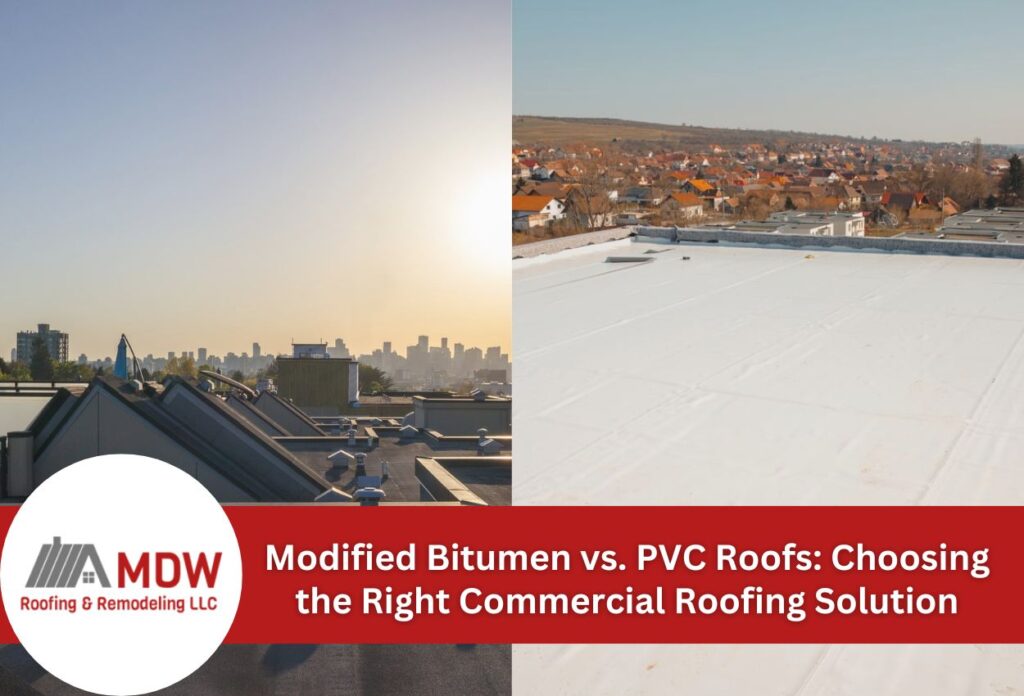Modified Bitumen vs. PVC Roofs: Choosing the Right Commercial Roofing Solution

Commercial property owners face a critical decision when choosing between flat roof membrane systems. Two popular options dominate the market: modified bitumen and PVC roofing systems.
Modified bitumen is a traditional approach to commercial roofing, combining asphalt with polymer modifiers to create a flexible, durable membrane. This multi-layer system has served commercial buildings reliably for decades, particularly in challenging weather conditions. PVC, classified among single-ply roofing options, provides a modern solution that offers energy efficiency and chemical resistance.
Knowing the differences between these flat roof membrane systems is essential when planning roof replacement or new construction projects. The choice between modified bitumen and PVC roofs affects installation complexity, longevity, and maintenance needs. Climate considerations, building usage, and existing roof conditions all influence which material delivers optimal performance for your specific commercial property.
Property owners must evaluate multiple factors beyond initial material selection, including compatibility with existing structures, local building codes, and anticipated building lifespan, to make the best decision. This guide will get into what property owners should consider when choosing between these popular flat roofing materials.
Factors to Consider When Deciding Between Modified Bitumen vs. PVC Roofs
Choosing a roofing material for your commercial building is a significant decision and should not be taken lightly. When comparing modified bitumen and PVC membranes, there are many things to keep in mind, including the following.
Material Composition and Construction Methods
Modified bitumen roofing systems feature sophisticated multi-layer construction that combines asphalt with polymer modifiers such as styrene-butadiene-styrene (SBS) or atactic polypropylene (APP). These commercial roofing materials utilize reinforcement fabrics, including polyester, fiberglass, or combination mats, that provide tensile strength and dimensional stability. The base sheet adheres directly to the roof deck, followed by intermediate plies and a granulated cap sheet that offers UV protection and weather resistance.
PVC is an advanced single-ply thermoplastic membrane manufactured from polyvinyl chloride resins combined with plasticizers, stabilizers, and reinforcing materials. These flat roof membrane systems typically incorporate a polyester scrim reinforcement layer sandwiched between PVC layers, creating a uniform membrane thickness ranging from 45 to 80 mils. The material’s thermoplastic properties allow seams to be chemically welded using hot air welding equipment, resulting in seams that are stronger than the membrane itself.
The construction differences between these roofing options significantly impact installation procedures and their performance over time. Modified bitumen requires heat application or cold adhesives for installation, while PVC membranes rely on mechanical fastening systems and heat-welded seams. Understanding these technologies helps property owners choose the best commercial roofing material for their building, whether PVC or modified bitumen.
Installation and Labor Requirements
Modified bitumen systems can be installed in three different approaches, each requiring specific equipment and labor expertise.
- Torch-applied installation involves using open flames to heat the membrane’s underside, creating immediate adhesion to the substrate. This method requires experienced crews trained in fire safety protocols and flame application techniques.
- Self-adhered modified bitumen eliminates fire risks by utilizing factory-applied adhesive strips that bond when protective release films are removed during installation.
- Cold-process applications use liquid adhesives or primers applied at ambient temperatures, making this option suitable for occupied buildings where flame restrictions apply.
PVC roofing installation centers on two primary methods that require specialized training and equipment.
- Mechanically fastened systems use screws and plates attached through the membrane into structural decking, with seams sealed using hot-air welding equipment.
- Fully adhered installations bond the entire membrane surface to substrate materials using approved adhesives, followed by heat-welded seam construction.
Both approaches require welding technicians skilled in operating specialized heat guns and maintaining consistent temperatures for proper seam formation.
Labor requirements vary significantly between these flat roof membrane systems. Modified bitumen installation typically requires larger crew sizes due to material handling and the multi-layer construction processes. PVC systems generally need fewer installers but need higher skill levels for welding, affecting project timelines and contractor selection for single-ply roofing options.
Weather Resistance and Climate Performance
Modified bitumen has exceptional performance under extreme temperature fluctuations through its polymer-enhanced composition. The SBS-modified versions maintain flexibility in freezing conditions while resisting thermal shock during rapid temperature changes. APP-modified systems excel in high-temperature environments, maintaining their stability when exposed to intense heat. The granulated surface layer provides substantial UV protection, preventing premature aging from continuous sun exposure. However, thermal cycling can cause gradual membrane fatigue over time, particularly at seams and penetration details where stress concentrates.
PVC roofing systems exhibit superior chemical resistance compared to other commercial roofing materials, making them ideal for restaurants, laboratories, or manufacturing facilities. The membrane’s inherent puncture resistance stems from its tough thermoplastic construction and reinforcing scrim layer. PVC also maintains its color stability and physical properties after decades of UV exposure. The material’s reflective properties reduce thermal cycling stress by maintaining lower membrane temperatures, even during peak sun exposure.
Performance differences often become apparent when evaluating these flat roof membrane systems in challenging climates. Modified bitumen handles freeze-thaw cycles effectively but may experience granule loss over time. PVC systems resist chemical degradation from acid rain and airborne pollutants while maintaining seam integrity through extreme weather events. Both roofing options require professional installation to maximize weather resistance, with welded PVC seams generally outperforming traditional modified bitumen in severe weather.
Maintenance Requirements and Repair Considerations
Modified bitumen roofing systems require regular inspections focusing on seam integrity, granule retention, and membrane flexibility. Property managers should schedule bi-annual inspections examining lap seams for lifting or separation, particularly around roof penetrations and perimeter details. The granulated surface needs extra attention to prevent exposing the underlying asphalt layers to UV degradation. Maintenance should include debris removal from drains, resealing minor cracks with compatible sealants, and monitoring for punctures from foot traffic or equipment placement.
PVC membrane maintenance often includes seam inspections using electronic leak detection equipment that identifies compromised welded joints before water penetration occurs. These flat roof membrane systems benefit from routine cleaning to remove accumulated dirt and biological growth that can affect reflectivity and membrane performance. Chemical compatibility testing is also essential when cleaning agents contact the membrane surface. Repairs for PVC typically involve heat-welding patches over damaged areas, making hiring trained technicians required for proper thermoplastic welding procedures.
Repair complexity varies significantly between these commercial roofing materials during maintenance. Modified bitumen repairs often require heat application or cold-process patching materials, with larger damaged areas needing complete section replacement. PVC systems allow localized welded repairs that restore original membrane strength, though specialized equipment and skilled labor may increase response times. Both flat roofing options benefit from preventive maintenance programs that extend service life through early problem identification and prompt corrective actions.
Longevity and Performance Expectations
Modified bitumen roofing systems typically have service lives ranging from 15 to 25 years under normal conditions, with this varying based on the local climate and maintenance practices. SBS-modified systems demonstrate superior longevity in freeze-thaw environments, while APP-modified versions excel in high-temperature regions. The multi-layer construction provides redundancy that extends overall system life, though granule loss and membrane aging gradually reduce effectiveness over time. Proper installation and regular maintenance can push this toward the upper end of expected service ranges.
PVC roofing systems consistently achieve 20 to 30-year service lives or longer in optimal conditions. These flat roof membrane systems benefit from inherent UV stability and chemical resistance that prevent premature degradation. The thermoplastic nature allows PVC membranes to maintain flexibility throughout their service life, reducing cracking and seam failure that commonly affect other commercial roofing materials. The heat-welded seam construction creates permanent bonds that often outlast the membrane itself.
Warranty coverage reflects the manufacturer’s confidence in the long-term performance of the roofing material. Modified bitumen manufacturers typically offer moderate material warranties, with labor coverage varying by contractor. PVC systems often come with premium warranty terms, with some manufacturers providing comprehensive coverage that includes labor and membrane replacement. In general, PVC’s longer lifespan exceeds warranty periods, while modified bitumen systems require more frequent maintenance to achieve their projected service lives.
Making a Final Decision Between Modified Bitumen and PVC for Your Commercial Property
Selecting between modified bitumen and PVC requires a careful evaluation of building-specific factors that directly impact long-term performance and operational success. Building type plays a crucial role in material selection, as structures housing chemical processing, restaurants, or laboratories benefit significantly from PVC’s superior chemical resistance. Meanwhile, warehouses, retail centers, and general commercial buildings often find modified bitumen’s proven durability and lower installation complexity more suitable for their needs.
Budget considerations extend beyond initial material costs to encompass installation labor, equipment requirements, and long-term maintenance expenses. Modified bitumen systems typically require lower upfront investments but may incur higher maintenance costs over their service life. PVC installations cost more upfront but often deliver superior long-term value through reduced maintenance needs and extended service life expectations. Property owners must evaluate the total cost of ownership rather than focusing solely on initial installation expenses when conducting a commercial roofing materials comparison.
Building age and existing roof conditions also influence which material is best for your building. Older structures with limited structural capacity may benefit from lightweight single-ply roofing options like PVC, while buildings requiring additional insulation might accommodate modified bitumen’s multi-layer construction more effectively. Future building plans, including potential expansions or equipment installations, should factor into material decisions to ensure selected systems can accommodate the anticipated modifications without compromising performance or warranty coverage. By thoroughly considering all these factors, property owners can make a final decision that maximizes their investment in a new commercial roof.
Expert Roofing Solutions in Houston from MDW Roofing & Remodeling LLC
Deciding between modified bitumen and PVC roofing systems is critical for protecting your commercial property’s roof in Houston. Each material has different advantages, whether it’s the robust, multi-layer protection of modified bitumen, ideal for high-temperature resistance, or the lightweight, chemical-resistant properties of PVC, perfect for areas prone to chemical exposure.
Understanding the specific needs of your building and budget is essential. MDW Roofing & Remodeling LLC specializes in both modified bitumen and PVC roofing installations, providing solutions that align with your commercial roofing requirements.
To discuss the best roofing material for your property and to get a detailed, professional assessment, call us today at (832) 766-9994. Let MDW Roofing & Remodeling LLC help you make the right choice with confidence.




